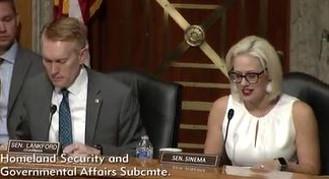Distributional Weights Should Be Dropped from the Draft Circular A-4
Weighting costs and benefits could result in large losses in efficiency

Scholarly analysis of the potential effects of particular rulemakings from federal agencies, and advice to Congress on how to improve the rulemaking process by GW Regulatory Studies Center scholars.

"Your input and expertise during the drafting of the Early Participation in Regulations Act of 2019 and SMART Act of 2019 was invaluable."
Senator Kyrsten Sinema (D-AZ)
Senator James Lankford (R-OK)
Joint statement
Distributional Weights Should Be Dropped from the Draft Circular A-4
Weighting costs and benefits could result in large losses in efficiency
Public Interest Comment on HUD's Affirmatively Furthering Fair Housing proposal
Recommendations for improving the framework around fair housing planning, assessment and engagement
Public Interest Comment on the DEA Proposed Rules on Telemedicine and Buprenorphine
Improving access to opioid use disorder treatments by making permanent pandemic-era flexibilities
Broadening Public Engagement in the Federal Regulatory Process
Public interest comment with input on public engagement initiatives by the Office of Information and Regulatory Affairs
SAMHSA Proposed Rule on Medications for the Treatment of Opioid Use Disorder
Public interest comment submitted in response to SAMHSA proposal to extend COVID-19 pandemic era flexibilities for accessing treatments for opioid use disorder
Factors Contributing to the Infant Formula Shortage
The Federal Trade Commission (FTC) has solicited public comments on the factors that may have contributed to the recent infant formula shortage.
FDA & Wholesale Drug Distributors
Dylan Desjardins offers ways for the FDA to improve the underlying assumptions, examination of alternatives, and review of unintended consequences for this proposed rule.
Energy Conservation Standards for Residential Clothes Washers
We served as members of the National Academy of Sciences Committee on Review of Methods for Setting Building and Equipment Performance Standards, and offer these comments based on the peer review we conducted between the fall of 2019 and spring of 2021.
Joint Letter to the Dept. of Energy
We served as members of the National Academy of Sciences Committee on Review of Methods for Setting Building and Equipment Performance Standards. We write to request that the Committee’s report and recommendations, “Review of Methods Used by the U.S. Department of Energy in Setting Appliance and Equipment Standards,”1 be placed on the rulemaking docket for rule EERE–2021–BT–STD–0003, “Energy Conservation Program for Appliance Standards: Procedures, Interpretations, and Policies for Consideration in New or Revised Energy Conservation Standards and Test Procedures for Consumer Products and Commercial/Industrial Equipment.”
National Environmental Policy Act Implementing Regulations
On October 7, 2021, the Council on Environmental Quality (CEQ) issued a notice of proposed rulemaking (NPRM) to revise its National Environmental Policy Act (NEPA) implementing regulations.
